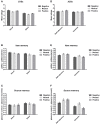Differential Effects of Valence and Encoding Strategy on Internal Source Memory and Judgments of Source: Exploring the Production and the Self-Reference Effect
- PMID: 31249542
- PMCID: PMC6582403
- DOI: 10.3389/fpsyg.2019.01326
Differential Effects of Valence and Encoding Strategy on Internal Source Memory and Judgments of Source: Exploring the Production and the Self-Reference Effect
Abstract
Item memory studies show that emotional stimuli are associated with improved memory performance compared to neutral ones. However, emotion-related effects on source memory are less consistent. The current study probed how emotional valence and specific encoding conditions influence internal source memory performance and judgments of source (JOSs). In two independent experiments, participants were required to read silently/aloud (Experiment 1) or to perform self-reference/common judgments (Experiment 2) on a list of negative/neutral/positive words. They also performed immediate JOSs ratings for each word. The study phase was followed by a test phase in which participants performed old-new judgments. In Experiment 1, the production effect was replicated for item memory, but the effects of valence on item and source memory were not significant. In Experiment 2, self-referential processing effects on item and source memory differed as a function of valence. In both experiments, JOSs ratings were sensitive to valence and encoding conditions, although they were not predictive of objective memory performance. These findings demonstrate that the effects of valence on internal source memory and JOSs are modulated by encoding strategy. Thus, the way information is encoded can shed light on how emotion might enhance, impair or exert no influence on source memory.
Keywords: emotion; internal source memory; judgments of source; metamemory; production effect; self-reference effect; valence.
Figures


Similar articles
-
Is internal source memory recognition modulated by emotional encoding contexts?Psychol Res. 2021 Apr;85(3):958-979. doi: 10.1007/s00426-020-01294-4. Epub 2020 Feb 14. Psychol Res. 2021. PMID: 32060700
-
Interactions of Emotion and Self-reference in Source Memory: An ERP Study.Cogn Affect Behav Neurosci. 2021 Feb;21(1):172-190. doi: 10.3758/s13415-020-00858-6. Epub 2021 Feb 19. Cogn Affect Behav Neurosci. 2021. PMID: 33608840
-
Source memory that encoding was self-referential: the influence of stimulus characteristics.Memory. 2017 Oct;25(9):1191-1200. doi: 10.1080/09658211.2017.1282517. Epub 2017 Feb 8. Memory. 2017. PMID: 28276984 Free PMC article.
-
Timing matters: negative emotion elicited 5 min but not 30 min or 45 min after learning enhances consolidation of internal-monitoring source memory.Acta Psychol (Amst). 2015 May;157:56-64. doi: 10.1016/j.actpsy.2015.02.006. Epub 2015 Feb 25. Acta Psychol (Amst). 2015. PMID: 25725193
-
Enhanced source memory for emotionally valenced sources: does an affective orienting task make the difference?Cogn Emot. 2024 Jun;38(4):508-529. doi: 10.1080/02699931.2024.2309707. Epub 2024 Jan 31. Cogn Emot. 2024. PMID: 38294694
Cited by
-
Is internal source memory recognition modulated by emotional encoding contexts?Psychol Res. 2021 Apr;85(3):958-979. doi: 10.1007/s00426-020-01294-4. Epub 2020 Feb 14. Psychol Res. 2021. PMID: 32060700
-
Decoding episodic autobiographical memory in naturalistic virtual reality.Sci Rep. 2024 Oct 27;14(1):25639. doi: 10.1038/s41598-024-76944-3. Sci Rep. 2024. PMID: 39463396 Free PMC article.
-
The Self-Reference Effect in Metamemory and the Role of Beliefs in This Process.Behav Sci (Basel). 2024 Aug 25;14(9):741. doi: 10.3390/bs14090741. Behav Sci (Basel). 2024. PMID: 39335957 Free PMC article.
-
Does Expecting Matter? The Impact of Experimentally Established Expectations on Subsequent Memory Retrieval of Emotional Words.J Intell. 2023 Jul 1;11(7):130. doi: 10.3390/jintelligence11070130. J Intell. 2023. PMID: 37504773 Free PMC article.
-
Interactions of Emotion and Self-reference in Source Memory: An ERP Study.Cogn Affect Behav Neurosci. 2021 Feb;21(1):172-190. doi: 10.3758/s13415-020-00858-6. Epub 2021 Feb 19. Cogn Affect Behav Neurosci. 2021. PMID: 33608840
References
-
- Batchelder W. H., Riefer D. M. (1990). Multinomial processing models of source monitoring. Psychol. Rev. 97, 548–564. 10.1037/0033-295X.97.4.548 - DOI
-
- Carroll M., Davis R., Conway M. (2001). The effects of self-reference on recognition and source attribution. Aust. J. Psychol. 53, 140–145. 10.1080/00049530108255136 - DOI
LinkOut - more resources
Full Text Sources

